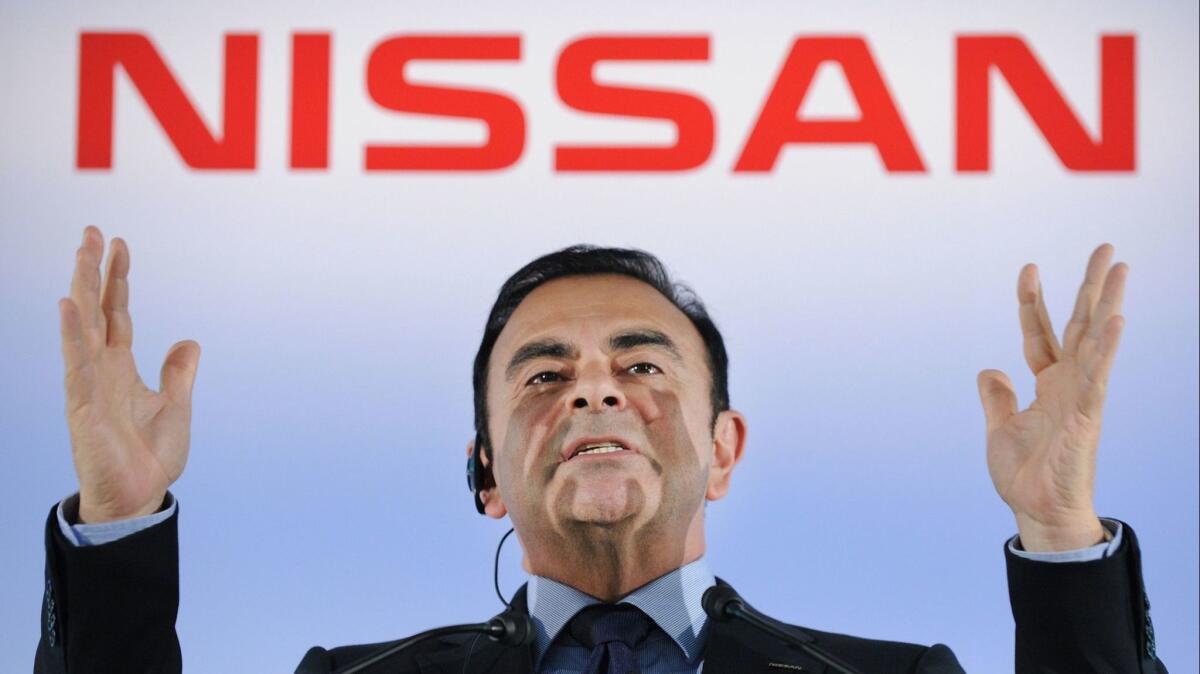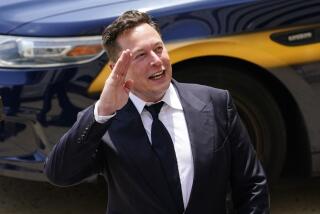Carlos Ghosn lived large but wasn’t paid as much as several other auto executives

During his jet-setting time at the helm of Nissan Motor Co., Carlos Ghosn earned a lot more than his Japanese peers — but not nearly as much as other global auto leaders.
Jetting around the world to supervise auto operations, Ghosn averaged about $15 million annually in total compensation during the five-year period through 2015 that is now the subject of investigation in Japan. That total includes what he was paid by Nissan and his other employer, French automaker Renault SA.
It was roughly 10 times as much as the leaders of Toyota Motor Corp. and Honda Motor Co. were each paid in the period, according to data compiled by Bloomberg. Further afield, though, auto executives were reaping much bigger gains, with company shares on top of salary.
Ford Motor Co., which twice reached out to Ghosn about its top job, paid its chief executive officer $24 million annually during the period. The late Italian auto executive Sergio Marchionne collected almost $40 million a year in that time, mostly from a large award related to the tie-up of Fiat SpA and Chrysler Group LLC.
Now, criminal investigators want to know whether Ghosn reported all his income properly and whether he dipped into the corporate till for personal outlays -- effectively subsidizing a life that had grown to include homes in Paris, Tokyo and Brazil, and other emblems of luxury, notably a 2016 wedding party at Versailles with a Marie Antoinette theme.
This week, Nissan announced that it had uncovered evidence — after being tipped by a whistleblower — that Ghosn underreported his income in Japan by $44 million, or 5 billion yen, and misused corporate assets. He was arrested, and the board of Japan’s second-largest automaker is set to vote Thursday afternoon on a motion to dismiss him. Since his detention, Ghosn has been unavailable to comment on the allegations. He hasn’t been charged.
Crisscrossing the globe in a corporate jet, Ghosn spread his time between a Tokyo penthouse that was raided this week by authorities and rarefied addresses in Paris and its suburbs; Rio de Janeiro; and Beirut, according to Japanese and French media reports.
Nissan informed Renault’s board Monday that its investigation included the finances of a Dutch-domiciled Renault-Nissan venture, Bloomberg reported previously.
According to Nikkei, a Netherlands affiliate of Nissan spent about $18 million on luxury homes for Ghosn in Rio de Janeiro and Beirut. The latter is notable since the automaker has no substantial operations there, while Ghosn, who speaks several languages and was born in Brazil, is of Lebanese descent. The Dutch subsidiary was funded entirely by Nissan, Nikkei reported, citing people it didn’t identify.
Records reviewed by Bloomberg show a Nissan subsidiary founded in 2010 in Amsterdam, Zi-A Capital BV, that lists Gregory Kelly, a Nissan executive detained along with Ghosn, as a director. Nissan has accused Kelly of helping Ghosn in the alleged scheme. Kelly hasn’t commented on the accusations.
In the U.S., public companies are required to break down pay, including perks like housing benefits, and list them in proxy statements. Japan-listed companies have been required since 2010 to disclose pay for executives who earn 100 million yen ($886,000) or more. That includes noncash perks like housing. No such benefits were listed for Ghosn. It’s unclear who paid for the penthouse he used in Tokyo.
Some of his properties were acquired before the period now in question. The Ghosn family had an estate in a suburb of Paris before he joined Nissan and took a share in a winery in Lebanon more than a decade ago.
Ghosn also dabbled in New York real estate. In the last decade, a limited liability company connected to him bought two units in a glass-fronted condominium building in Manhattan’s West Village, according to public records, which show two of his daughters as onetime residents. The units were sold in the last two years for about $6 million.
Other income-producing opportunities have come his way as well. He was the chairman of AvtoVAZ, a Russian automaker owned by Renault, until 2016. He was on the Alcoa Corp. board until 2011 and earlier had seats on the boards of Sony Corp. and International Business Machines Corp.
In his initial days at Nissan, Ghosn made a name for himself as a cost-cutter who enjoyed marathon bridge sessions.
The public displays of wealth increased after Ghosn split with his first wife, Rita, whose post on social media this week referred to “narcissists” who believe rules apply only to others, according to Forbes.
In the fall of 2016, Ghosn celebrated his second marriage to Carole. With movie director and fellow winemaker Sofia Coppola providing inspiration with her film “Marie Antoinette,” the family tricked out the palace at Versailles with actors in period costumes and fancy desserts in a nod to the beheaded queen’s culinary preferences.
The lavish party was a combination wedding celebration after a civil ceremony and 50th birthday fete for his new wife, who was quoted in Town & Country magazine as saying: “We wanted it to feel as if we were inviting guests into our home —nothing too studied.”
In Japan, public displays of gaudiness tend to be frowned upon, and an often-quoted adage says a nail that sticks up gets pounded down. Resentment toward Ghosn, personal or professional, has been an undercurrent in the boardroom intrigue that led to his arrest.
Some Japanese executives were concerned their company was getting the short end of the deal, contributing most of the alliance’s profits while Renault retained voting control. Earlier this year, Ghosn was leading negotiations to formally combine Renault and Nissan and would have run the merged company, people with knowledge of the matter have said.
At a news conference Monday evening in Tokyo, Nissan CEO Hiroto Saikawa said the investigation started with a whistleblower’s complaint. The whistleblower is a non-Japanese executive in the legal department who agreed to a deal with prosecutors under a new plea-agreement law intended to ferret out wrongdoing, according to local media.
Whether or not a whistleblower had it out for the auto alliance is unknown. But at Nissan, where tensions were rising, a sense of “us against them” may have been exacerbated by a chairman who, though long revered, led a lifestyle that was otherworldly to the salarymen underneath him.
Weinberg and Melin write for Bloomberg
More to Read
Inside the business of entertainment
The Wide Shot brings you news, analysis and insights on everything from streaming wars to production — and what it all means for the future.
You may occasionally receive promotional content from the Los Angeles Times.










